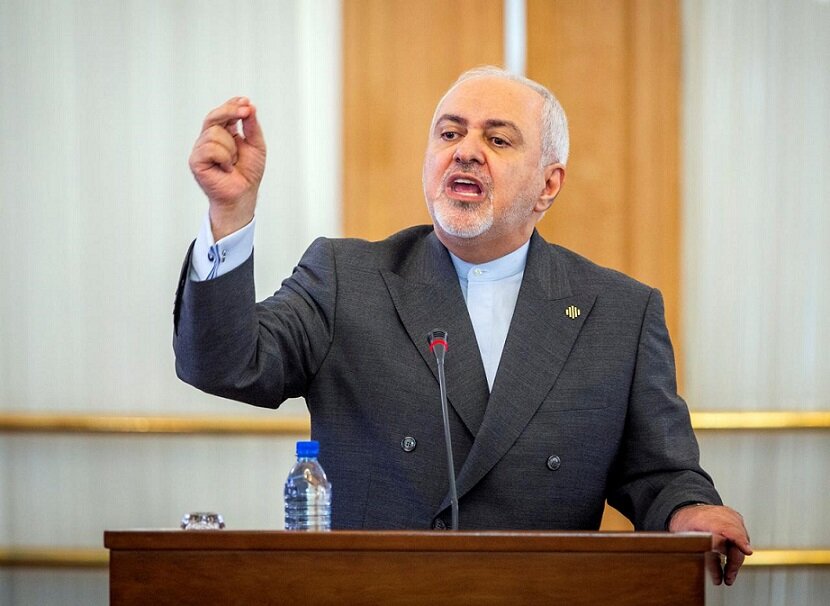Zarif calls on U.S. to choose comity over failed Trump policies

TEHRAN – Iranian Foreign Minister Mohammad Javad Zarif has said that the United States has to make a fundamental choice under President Joe Biden.
“The new U.S. administration has a fundamental choice to make: It can embrace the failed policies of its predecessor, and continue down the path of contempt for int'l cooperation & int'l law. Or, it can reject failed assumptions & seek peace and comity,” he said in a tweet on Friday.
Zarif also shared his latest article that was published by Foreign Affairs Magazine. In the article, the chief Iranian diplomat outlined Iran’s view on the possible U.S. return to the 2015 Iran nuclear deal, officially known as the Joint Comprehensive Plan of Action (JCPOA).
“The new administration in Washington has a fundamental choice to make. It can embrace the failed policies of the Trump administration and continue down the path of disdain for international cooperation and international law—a contempt powerfully evident in the United States’ decision in 2018 to unilaterally withdraw from the Joint Comprehensive Plan of Action, commonly known as the Iran nuclear deal, that had been signed by Iran, China, France, Germany, Russia, the United Kingdom, and the European Union just three years earlier. Or the new administration can shed the failed assumptions of the past and seek to promote peace and comity in the region,” the Iranian foreign minister noted.
He said the U.S. should remove all the sanctions imposed by Trump against Iran. In exchange, Iran will reverse its nuclear measures.
“The incoming Biden administration can still salvage the nuclear agreement, but only if it can muster the genuine political will in Washington to demonstrate that the United States is ready to be a real partner in collective efforts,” Zarif wrote. “The [Biden] administration should begin by unconditionally removing, with full effect, all sanctions imposed, reimposed, or relabeled since Trump took office. In turn, Iran would reverse all the remedial measures it has taken in the wake of Trump’s withdrawal from the nuclear deal. The remaining signatories to the deal would then decide whether the United States should be allowed to reclaim the seat at the table that it abandoned in 2018.”
According to Zarif, the Biden administration can still salvage the nuclear deal, but the window for saving the agreement is narrowing, and that it’s up to the U.S. to take the initiative to prevent the JCPOA from collapsing.
“The window of opportunity for the new U.S. administration will not be open forever,” Zarif warned. “The initiative squarely rests with Washington. The Biden administration’s first step ought to be to seek to redress—rather than attempt to exploit—Trump’s dangerous legacy of maximum failure.”
The Iranian foreign minister also called on Washington to remove the sanctions Donald Trump imposed on Iran, saying that removing these sanctions will open new possibilities in the region.
“It can begin by removing all sanctions imposed since Trump assumed office and seek to reenter and abide by the 2015 nuclear deal without altering its painstakingly negotiated terms. Doing so will open new possibilities for peace and stability in our region,” Zarif said.
The foreign minister’s article came two days after Biden was inaugurated as the 46th president of the United States. During his election campaign, Biden had vowed to revive the JCPOA from which the Trump administration withdrew on May 8, 2018, reimposing sweeping economic sanctions on Iran.
However, Biden said he will rejoin the JCPOA only to use it “as a starting point for follow-on negotiations,” which means that Biden may have concluded that reviving the JCPOA in its original form is not enough. The Biden administration is coming under increasing pressure from Washington hawks to pursue follow-on negotiations with Iran over thorny issues such as Iran’s missile program and its regional influence.
But Zarif said that these issues are not up for negotiations.
“Iran’s defense and regional policies were not up for discussion, because the West was not prepared to abandon its interference in our region, which has caused such turmoil for decades; nor was the United States—or France or the United Kingdom, for that matter—ready to limit its lucrative arms sales, which have fueled conflict and drained the resources of our region,” he noted.
The foreign minister said Iran is willing to discuss the problems of the region. “But the peoples of the region, not outsiders, must resolve these issues. Neither the United States nor its European allies have the prerogative to lead or sponsor future talks. Rather, the Persian Gulf region needs an inclusive regional mechanism to encourage diplomacy and cooperation and to lower the risk of miscalculation and conflict,” he continued.
The chief Iranian diplomat once again presented Iran’s Hormuz Peace Endeavor, also known as HOPE, which Iran presented to the UN General Assembly in 2019.
Zarf said the region’s countries can use this forum to “address anxieties with confidence-building measures, resolve grievances through dialogue, and engage in mutually beneficial efforts to solve shared problems and safeguard collective interests.”
“HOPE is not a blueprint for the future—any permanent arrangement has to be arrived at collectively by all regional powers. But the proposal reflects Iran’s aspiration for a strong, stable, peaceful, and prosperous community of countries, free from the impositions of regional or global hegemony,” the foreign minister pointed out.
SM/PA
Leave a Comment